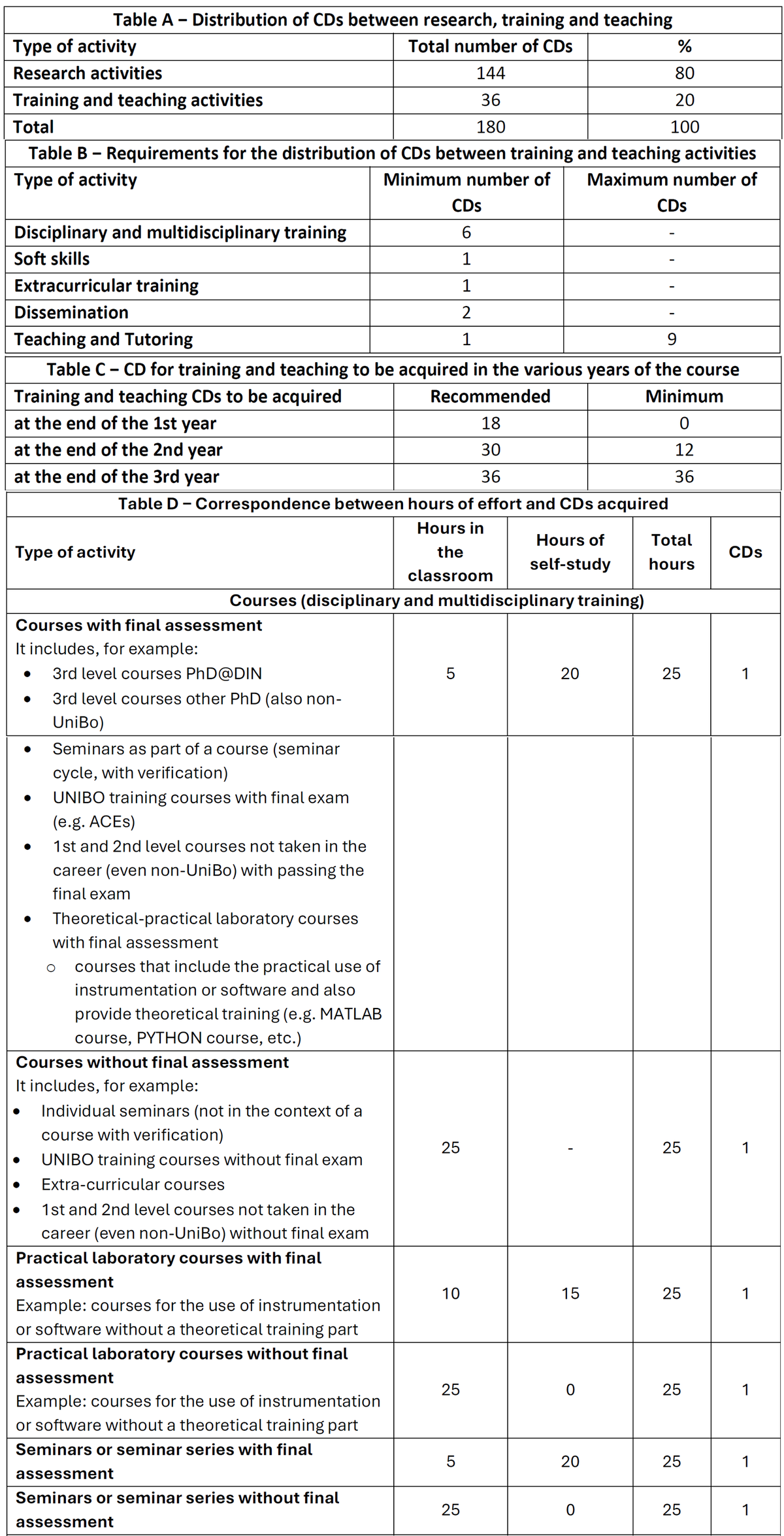Learning and Research Programme
Applicable from the 40th Cycle

DISTAN learning and research program foresees:
a) Conducting an individual research program under the guidance of one or more supervisors, initially proposed by the candidate, which may be redefined and updated, and is ultimately reviewed and approved by the Academic Committee, in a field covered by the PhD program;
b) Participation in educational, training, and outreach activities that complement research work, selected by the candidate in collaboration with their supervisor, to obtain at least 36 doctoral credits out of the 180 required over the three-year program. Training activities that qualify for credits include:
- disciplinary, multidisciplinary, and transdisciplinary courses specifically designed for the third-level education cycle by the DIN Department or other PhD programs, including non-UniBo ones;
- transferable skills activities provided by UniBo for the third-level education cycle, such as advanced language and IT training, teaching experience, training in research management, dissemination and exploitation, intellectual property, understanding of European and international research systems, open access to research data and results, and fundamental principles of ethics, gender equality, and integrity, including career opportunities for PhD graduates;
- conferences, summer schools, workshops, seminars, and university courses in topics related to or complementary to the research program.
c) Completing a period abroad aimed at increasing the level of internationalization of one’s research activity.
d) Conducting internships or placements in companies, universities, or research centers (in Italy or abroad) in addition to the three months mentioned in the previous point.
e) Publication of at least two articles over the three years of the program, preferably in scientific journals or indexed conference proceedings, along with consistent updates to the iris database (https://cris.unibo.it/) with the research results produced by the candidate.
f) Completion and regular updating of one’s personal webpage on the UniBo site and annual completion of OPID questionnaires on doctoral students' opinions, as well as the Almalaurea questionnaire upon submission of the final thesis.
g) The training program concludes with the drafting of the final thesis in English, evaluated by external reviewers and subsequently defended before a committee of expert members. Details on the final examination process are published on the DISTAN website (https://phd.unibo.it/dast/en/phd-programme/learning-program).
The progress and consistency of the training and research program are assessed annually, along with the acquisition of training credits and compliance with other requirements, by the Academic Committee during the year-end meeting, where an annual report and a presentation of the activities carried out are evaluated.
Templates for the annual reports are attached and available on the PhD program’s website.
The doctoral students' path is governed by the University Regulations on Doctoral Programs (https://www.unibo.it/it/studiare/dottorati-master-specializzazioni-e-altra-formazione/dottorati/regolamento-dateneo-in-materia-di-dottorato).
Starting from the 41st Cycle DISTAN PHD Course Program adopts the Doctoral Credits (CD) system.
The CD is a measure of the PhD student's load associated with the research activities, the education/training activities, and the teaching activities in order to gain the PhD Diploma.
The aim of the CD system is to provide a structured and monitorable educational path characterized by suitable flexibility to be adapted to the different cultural needs of the specific research domains of DISTAN PhD students.
Verification of the educational path
a. At the end of the first year of the Doctorate, the PhD student must submit to the DISTAN Academic Board a report of the research activities performed and a program for his three-year educational path, agreed and countersigned by his tutor, which must contain: i) the educational and training activities and the research stays abroad already carried out (according to Tables A,B,C,D), together with the documents certifying the participation in such activities and the corresponding credits; ii) a plan of the educational and training activities to carry out in the following two years; the procedures for submitting these documents are detailed in point e;
b. At the end of the second year of the doctorate, the PhD student must submit to the DISTAN Academic Board an updated report of the research activities performed and of the program for his three-year educational path, agreed and countersigned by his tutor, which must contain: i) the educational and training activities and the research stays abroad carried out during the second year of the doctorate (according to Tables A,B,C,D), together with the documents certifying the participation in such activities and the corresponding credits; ii) a plan of the educational and training activities to carry out in the third year of the doctorate; the procedures for submitting these documents are detailed in point e;
c. At the end of the third year of the doctorate, the PhD student must submit to the DISTAN Academic Board a report of the research activities performed and of his three-year educational path, countersigned by his tutor. The report on the scientific activities must summarize the activities performed during the first two years and highlight the activities of the third year; the report on the educational path must contain: i) the educational and training activities and the research stays abroad carried out during the third year of the doctorate (according to Tables A,B,C,D), together with the documents certifying the participation in such activities and the corresponding credits; the procedures for submitting these documents are detailed in the point e;
d. The documents certifying the participation in the educational and training activities can be: i) certificates of attendance in the case of conferences, workshops, summer schools, seminars; ii) signatures of attendance in the case of bachelor/master/doctoral courses without final examination; iii) declaration of having successfully sustained the final examination in the case of bachelor/master/doctoral courses with final examination, signed by the professor responsible for the course;
e. To facilitate the submission of the documents indicated in points a, b and c, each PhD student will be provided with a OneDrive personal folder, and upload procedures will be indicated by the PhD board. The report produced at the end of each year must be uploaded at the web platform: Dottorandi (unibo.it).


DAST Learning and Research Programme - 41st and 40th cycles
Website dottorandi.unibo.it for cycles from 40th
-
Instructions on the usage of dottorandi.unibo.it website